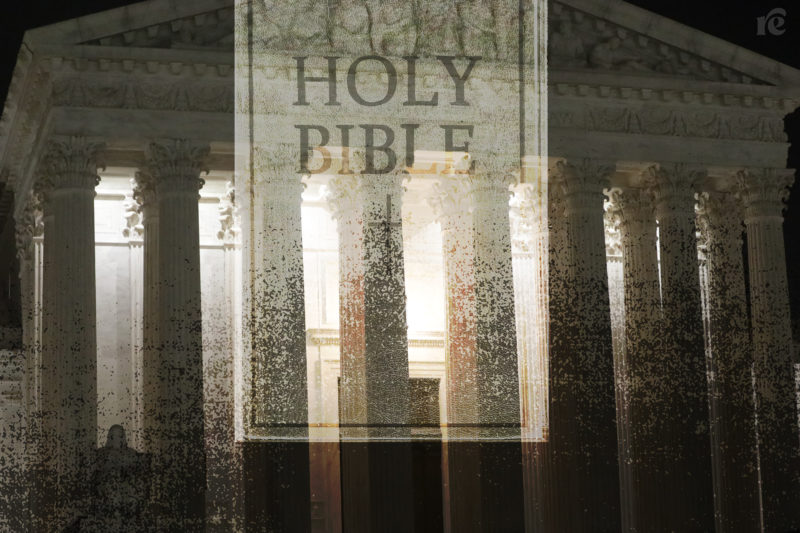An Illegitimate Supreme Court Returns—and This Term Will Be Worse
The Supreme Court's conservative supermajority overturning Roe v. Wade set into motion an off-the-rails new term.

It’s hard to imagine a Supreme Court term worse than last year’s, when the Court’s conservative wing overturned Roe v. Wade—and a number of other settled precedents—just because they could.
I’m here to tell you this term will be worse. And in a lot of ways, it was the decision in Dobbs v. Jackson Women’s Health Organization dismantling Roe that has set up this new term to go completely off the rails.
First, a recap.
It has been 13 months since the Court allowed Texas SB 8 to take effect, functionally overturning Roe in practice on their shadow docket, and exactly 101 days since the Court formally reversed Roe, sending abortion back to the states, for now. In that time, more than a dozen states have banned abortion outright, and Republican senators have introduced a nationwide 15-week abortion ban.
This series of decisions related to abortion rights alone has helped set the stage for the decimation of rights that will come this term. And that decimation is designed to serve one primary purpose: to further advance the cause of Christian nationalism in this country.

To be clear, the Court has been whittling away at the edges of secular society for a decade now. Do you know Hobby Lobby, Little Sisters of the Poor, Trinity Lutheran, Masterpiece Cakeshop, or the Espinoza cases? When taken together, these cases have eroded the distinction between church and state under Chief Justice John Roberts. Corporations and businesses exercising religious rights. Taxpayer funding of religious schools. These things exist thanks to the Roberts Court.
Put another way, the Roberts Court has been engaged in one of the most radical legal revolutions of our country’s history—a lurch away from religious pluralism and toward insulating evangelical Christianity from democratic rule.
This Supreme Court term is poised to take us even further away from our democratic ideals and closer to the kind of world dreamed up by Justice Samuel Alito in the Dobbs decision—where theocrats set the rule of law and 16th century thinkers define our codes of conduct. This version of American nationalism is really a theocratic nationalism embraced by folks like Justice Clarence Thomas and his wife Ginni, who recently appeared before the January 6 committee to discuss her role in rejecting the 2020 election results. It’s the version of America that Josh Hawley, Marjorie Taylor Greene, Lauren Boebert, and the entire MAGA movement are set on imposing. It’s a movement well on its way.
What do I mean when I say Christian nationalism? I mean exactly that. It’s an ideology that understands the United States to be a Christian nation, one founded not on vague aspirations of being some beacon on the hill, but with an explicit religious mission at its core. It’s a project to reorder our laws and society.
It’s an ideology that, unsurprisingly, shares a lot in common with fascism. Both are authoritarian in nature and seek to use social and cultural controls—like banning books and abortions—to enforce, with violence if necessary, their political ideology.
The previous presidential administration supercharged this movement. Now, the Roberts Court is set to light the match.
Already this term, the Court is poised to end race-based affirmative action programs as we know it, strike down the Indian Child Welfare Act to further facilitate the removal of Indigenous children to evangelical homes, grant businesses the license to fully discriminate against LGBTQ people, and create a mechanism where gerrymandered state legislatures can ignore their own voters and declare their favorite candidate the electoral victor. And that’s just in the first few months!
This term could end with one of the greatest power grabs of our rights in history. As my colleague Imani Gandy has observed, the conservative legal movement is on a quest to erase Black and brown folks from civic and political participation, but to do so they must rewrite decades of progress. We saw it with the overturn of Roe, and it will continue in this new term.
When it comes to the no good truly terrible Supreme Court, I keep thinking the @FedSoc 6 have become an arm of the Christofascist project to basically erase marginalized people from society. It's a project that is inherently steeped in whiteness.
Think about the cases this term:
— Imani Gandy (Orca’s Version) ⚓️ (@AngryBlackLady) September 29, 2022
There are some silver linings, though. We have Justice Ketanji Brown Jackson, a brilliant jurist, powerful communicator, and the first Black woman to sit on the Supreme Court. Her addition to the bench, and the dissents she will author, will help shape a new progressive legal movement that will rebuild from this backlash.
We have a growing movement for real court reform as more people understand that having a federal judiciary stacked with Federalist Society stooges amounts to tyrannical rule. By the end of this term, I expect the numbers of folks advocating for meaningful court reform to swell. We’ve also even inched toward greater transparency with the Court as it continues to livestream oral arguments this term despite also being open to the public for arguments. More people listening to oral arguments is a good thing if court reform is to become a reality.
This Supreme Court term is the greatest threat to democracy since Donald Trump and his army of MAGA minions attempted to overthrow the government. And it’s no coincidence that the Court kicked off this power grab with dismantling Roe.

